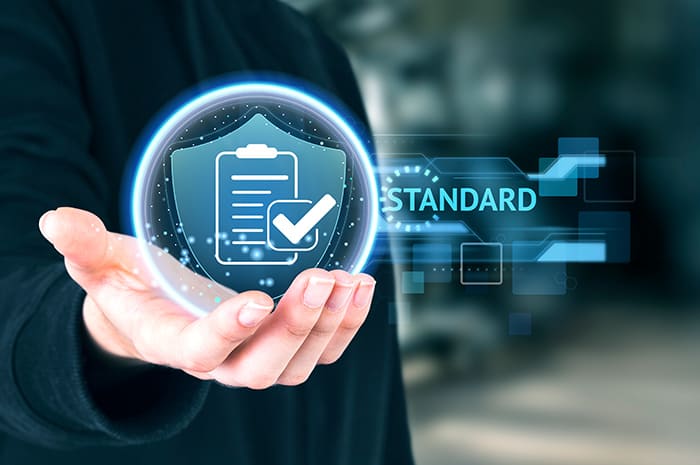ISO 20000-1 certification
- Neeraj O -The word “what "beside anything has always been a mystery. And then one day someone decided to fold their sleeves to try solving it. Maybe that is what makes scientists respected. They choose to solve mysteries that no one dares to. As time evolved, today we have everything recorded and automated to keep record of our surroundings.
In a world like this, we need to make sure we meet the standards and stay competitive. One such way to prove our shot in the industry market is the International Standards.
At Firstwave, we try to learn and stay up to the market standards every chance we get. Something like being curious about the word “what” every chance we get. That is applicable to any organisation out there as well.
Today we will be understanding the concept of ISO 20000-1 .A leading international standard for information security management systems (ISMS).
We focus on providing cybersecurity assessments, and it’s worth keeping an eye on updates on the importance of ISO for an organisation. A survey for the year 2020 and 2021 shows a 50% worldwide increase in ISO/IEC 20000-1:2018 certificates between 2020 and 2021. As of the end of 2022. The end of the next year, there were 14,897 ISO/IEC 20000-1 certificates worldwide, 29% increase.
Just like the “what” that lingers in your heart as a puzzle that needs to be solved, let us try to understand the concept of ISO 27000-1.
What is ISO 20000-1 certification?
What is ISO 20000-1 certification?
ISO 20000-1 is the international standard for IT Service Management (ITSM). It is developed by the International Organization for Standardization (ISO) and the International Electrotechnical Commission (IEC).
For example, remember the “lemonade stand” you used to set up in the porch as a kid with your friends? To make sure the business runs smooth you also had to make sure everything is up to the standards and well maintained (like, having enough lemons, everyone knows their part in the stand you set up, have happy customers and fix any issues as soon as you see it). ISO 27000-1 is rulebook set by understanding and researching different organisation that helps you run your “lemonade stand” (IT service Industry) to make sure they meet the standards internationally.
It defines the requirements for a service management system, ensuring quality and consistency in all IT services provided, whether delivered internally or externally.
This standard was first introduced in the year 2005 and revised in 2018, ISO 20000-1 was designed to match the way other standards were organised, like ISO 9001 (quality) and ISO 27001 (Information security). This helped companies to add ISO 20000-1 into their systems.
Difference between ISO 20000-1 and ISO 20000?
ISO 20000 is a family of international standards focused on IT service management, covering various guidelines and best practices for how IT services should be managed.
And ISO 20000-1 is a part of this family with the core standards mentioned which specifies the actual requirements any organization need to meet. This standard helps an organisation with continuous improvement in their service management system (SMS). The requirements mentioned in ISO 20000-1 must be ticked off to get certified for IT service Management.
The other parts of the ISO 20000 series (ISO 20000-2 or ISO 20000-3) includes guidance, recommendations, or explanations, which is important but not as much as ISO 20000-1. As ISO 20000-1 contains the main rules used for certification.
Let us go back to the lemonade stand you made as a kid. Iso one day you made a series of storybooks with your friends on how to run the best lemonade stand in town. The name of the whole box set of storybook based instruction is ISO 20000. A set of books in this box that explains all rules and regulations to help make the best lemonade store.
There is a book in this set called ISO 20000-1, the main rulebook. This rulebook follows all important rules that helps you run the best stand in town step by step. So, your customers are going to check this book from the set when they say, “Is your stand as good as it can be?”


How ISO 20000-1 Helps Indian IT SMEs Win Government Contracts
ISO 20000-1 plays a vital role for Indian IT SMEs seeking government contracts. Many governments have ISO 20000-1 certification as one of their mandatory or highly preferred requirement, making it a crucial qualifier for participating in public sector bids. This is because of the value it holds. Basically, means how the organisation is performing good and meets the standards for running an organisation. By achieving this certification, Indian IT SMEs proves their commitment to global best practices, consistency in service delivery, and continuous improvement. Certification helps increases an SME’s chances of being shortlisted and provide a competitive edge, helps with organization’s credibility, and make the evaluation process quicker and more favourable for the SME.
Additionally, Indian SMEs may benefit from government subsidies that offset certification costs, making it an accessible investment with significant returns in the form of expanded business opportunities and stronger public sector relationships.
Let us see the lemonade stand you set up with your friends. There is a town fair, and you really want to have your business at the fair. And the town head says only the best stands get to be a part of the fair.
So, the ISO 20000-1 helps you get into the fair. It proves to the people organizing the fair (like the government giving out contracts) that you are eligible for the contract as you follow all the rules and guidelines to run the lemonade stand well organised.
When you prove that you follow every rule in the guidebook (got ISO 20000-1 certified), the organizers trust you more. This proves that your lemonade stand won’t mess up, with quality, and treat customers kindly. Some organisers only let the stands with guidebooks to be a part of the fair.
In this case, IT SMEs with ISO 20000-1 (the golden guidebook for your lemonade stand) helps the government (the fair organisers) want to pick you, because they know you’ll do a great job and follow the guidebook for a better performance.
Benefits of ISO 20000-1 for Indian IT SMEs
ISO 20000-1 provides several important benefits for Indian IT SMEs.
It proves that an SME’s IT service management processes have been independently verified to meet international standards. This helps with credibility and trust with government clients. But why? Because any procurement team would view certified SMEs as less risky and more reliable, and that also helps increase the chances of being selected.
In case of the lemonade stand, if judges are convinced that you follow the rulebook, they trust you more. It’s like an official statement that says, "I know how to make the best lemonade without any mistakes!" That makes the judges more likely to choose you.
Having yourself certified pushes SMEs to document and update their workflows regularly, clarify responsibilities, and have a clear procedure for the IT services provided. When certified, it is a promise made that requires regular monitoring, incident management, and continual improvement. That helps stand out in the market with a greater efficiency and more consistent service delivery. Why you ask? It ensures minimal errors, minimal downtime, quicker problem resolution, and happier customers, which are all necessary for meeting government expectations.
In your lemonade stand, the rulebook states that everyone should know their respective job role, so you work faster and never face an issue. Every customer gets the same tasty lemonade, and nobody argues over who’s doing what.
Competitive Edge Over Non-Certified Firms
In today’s world, where the market is fierce and firms offer similar services at negotiable prices, ISO 20000-1 certification can play a major role, it differentiates an SME from non-certified competitors. Certified firms are seen mature, well-managed, and committed to best practices which helps them in scoring and evaluating better during the selection. The certification tells clients that your organisation prioritizes quality and is dedicated to improvement, helping to secure more contracts and long-term partnerships.
Now let’s get back to your lemonade stand, if there is another lemonade stand in town that does not have a rulebook. The judges will see that you’re much better organized because you have a rulebook to help your stand get better. That makes your stand the better choice, and you have a better chance to win spots at the fair.
Challenges Faced by SMEs
Indian IT SMEs face several challenges in the process to win government contracts and compete effectively in the market.
So, let’s get to the sensitive part. With all this advantages of ISO certification, let’s consider some challenges for the same.
It’s like when you want to show the world you can dance on a global stage, but then there are other dancers out there who are far more capable than you. So, now you need to keep updating your skills until you are capable. And the challenges you face along the way is what we will discuss about.
Some organisations have no idea about government tender opportunities or tendering process in general. Even when certified they might have no idea on writing competitive proposals to meet the strict bidding requirements.
Many SMEs might lack financial requirements and qualified/skilled manpower for the same to compete with larger firms, including difficulties affording bid bonds or managing cash flow since government contracts often require upfront investment before payments are received.
An SME without the necessary quality management system, technology or expertise might find it difficult to meet the government standards.
SMEs compete with larger organisations for bids, making it difficult for them to stand out.
Delayed payments from government and a low-profit margins of government contracts discourage some IT firms from bidding. This problem has been seen even in large Indian IT companies and can cause cash flow problems and financial risks for SMEs.
Many SMEs (rural/semi-urban) face challenges adapting to digital tools and technologies. This limits their market reach as they won’t be updated as compared to the urban market.
There are also cases where government policies such as local content requirements or changing tender criteria can exclude SMEs or create additional hurdles for participation.
SMEs find it difficult identifying new markets and marketing their services effectively to government buyers.
Conclusion
To wrap things up, we’re really proud to hold the ISO 20000-1 certification here at Firstwave. it’s our way of showing how seriously we take service quality and IT management. But we go beyond that! We help other organizations become certified, sharing what we’ve learned so the whole industry can grow together. If you’re interested in learning more or want to explore certification for your own team, do contact us!


